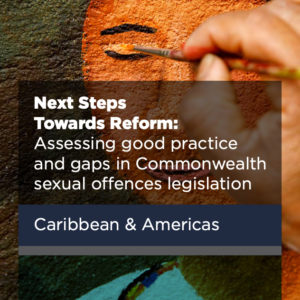In Grenada sexual offences laws are found in the Criminal Code 1990 [Chapter1] (CC) as amended by the Criminal Code (Amendment Act) 2012.
The 2012 amendments made significant positive changes to sexual assault offences, such as introducing gender-neutral offences, a comprehensive definition of penetrative offences with serious penalties, and criminalising marital rape. However, some aspects of the legislation do not meet good practice and international human rights standards, for example, not legislating expressly against a requirement for corroboration nor prohibiting the use of evidence of the prior sexual history of the complainant. Derogatory terms are used to refer to persons with intellectual disability and the legislation removes the capacity of such persons to consent to sexual activity. Although there are gender-neutral child sexual assault offences, there are no close-in-age exceptions to avoid criminalising young people and children who engage in consensual sexual activity with their peers. The age of consent for heterosexual sexual activity is 16 years.
Although penalties for sexual offences are not assessed, it is noted that marital rape is treated less seriously than non-spousal rape and penetration with objects is treated less seriously than penile penetration, despite evidence indicating the harm suffered by the complainant can be equally devastating.
Grenada has not decriminalised same-sex sexual activity. ‘Unnatural sexual connection’ between two consenting adults is an offence. Criminalising same-sex sexual activity is a breach of international human rights law. Laws that criminalise consensual same-sex sexual activity, such as ‘buggery’ and ‘sodomy’, should be repealed and all non-consensual sexual acts, including anal ‘rape’, should be included in the standard sexual assaults provisions, such as ‘rape’ and ‘sexual assault’, as well as in child sexual offences. All of these crimes should be gender-neutral.
Grenada is a state party to relevant international and regional human rights treaties, including the Inter-American Convention on the Prevention, Punishment, and Eradication of Violence against Women (Convention of Belém do Pará), UN Convention on the Elimination of All Forms of Discrimination against Women, Convention on the Rights of the Child, Convention on the Rights of Persons with Disabilities and International Covenant on Civil and Political Rights. It has not ratified the Convention against Torture and Other Cruel, Inhuman or Degrading Treatment or Punishment.
Read more about the criminalisation of LGBT people in Grenada.
The full assessment of Grenada is available here.



